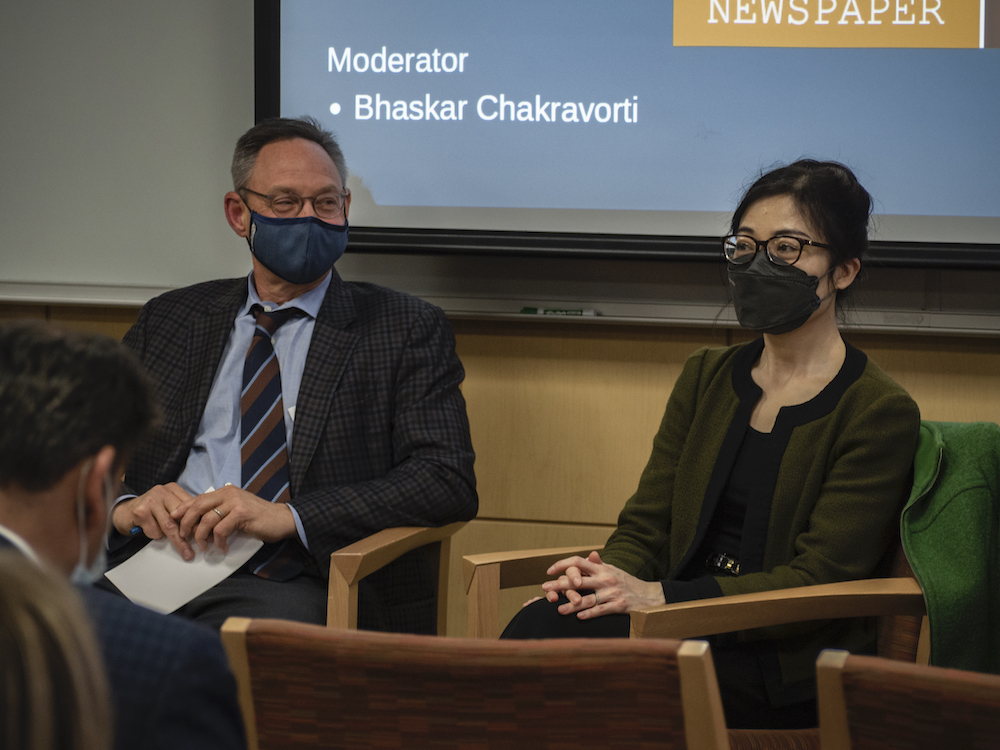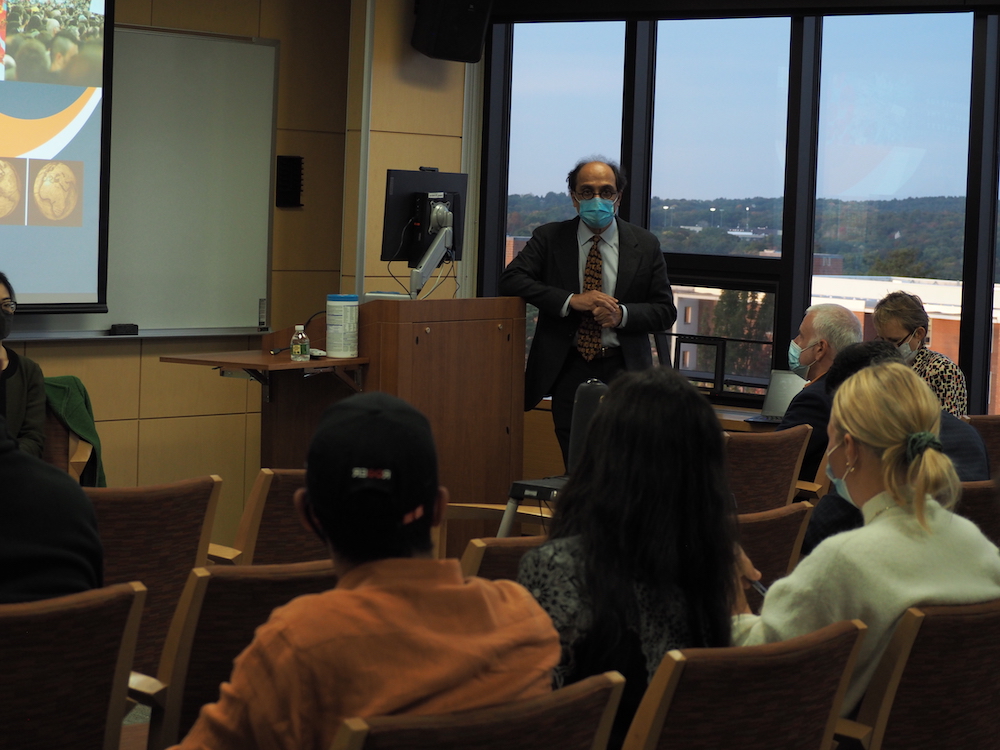
Fletcher Reads the Newspaper | Will ESG Investing Save the World?
Emma Stevenson, MALD ’23
On Wednesday, October 20, the IBGC hosted the 18th installment of the “Fletcher Reads the Newspaper” series, which engages Fletcher’s interdisciplinary experts, students, faculty, and alumni, in a discussion surrounding a current news topic. The news topics often have complex, interdisciplinary debates surrounding them, making them the ideal catalysts for discussion among the Fletcher community, as well as the public and prospective students. These events provide a platform for generating ideas and applying skills and contextual knowledge integral to the Fletcher experience.
This event centered around the debated topic of ESG (environmental, social, and governance) investing and its potential impact on global development. As we think about the challenges and threats to our changing world, ESG investing offers a solution by focusing on businesses’ collective action for social and environmental change. The IBGC collected an expert panel to debate about arguments for and against ESG investing. Panelists also discussed opportunities for mediation and opened the discussion to the attendees, asking them to think about recommendations to improve the impact of ESG investing in the future.
Bhaskar Chakravorti, Dean of Global Business, served as the moderator for this event. Key speakers from the Fletcher community include Quyen Tran, Professor of Practice at Fletcher and Director of Impact Investing at Blackrock, Kenneth Pucker, Senior Lecturer at Fletcher and Advisory Director at Berkshire Partners, and Katie Panella F’19, Project Manager at Impact-Weighted Accounts at Harvard Business School.


Dean Chakravorti set the stage for the discussion, allowing our panelists five minutes to provide their positions and then offering them time to deliver a rebuttal. The debate revolved around the questions of “how do we save the world,” and “can ESG investing provide a solution?” Should investors pump capital into ESG mutual funds so that companies can mobilize this capital to create a sustainable and societal impact? These questions sparked differing views among the panelists and encouraged problem-solving about the future of ESG investing.
Professor Tran took the pro-stance on ESG investing, stating that we need to define what ESG investing is, and is not, and if applied effectively, ESG investing can drive positive social and environmental impact. As Director of Impact Investing at Blackrock, Tran provided insights on helpfulness and shortfalls of existing analytical tools, such as MSCI ESG ratings, which attempts to measure a company’s resilience to long-term ESG risks. These ratings measure how companies operate, not their products and services. In addition, these ratings are relative to a specific industry. The key to creating impact is to understand the methodology behind the data and what it captures and does not capture; otherwise, we risk not arriving at our intended impact outcomes. Tran asserted that if companies use ESG analytics and data correctly, we can arrive at sustainable outcomes that can help us move towards the UN Sustainable Development Goals.
Kenneth Pucker provided the rebuttal to Professor Tran’s positive take on ESG investing, citing issues surrounding the lack of a concrete definition or legal framework for ESG investments. Pucker argued that sustainability would not come from the asset management sector. Asset managers present ESG products as the ultimate “win-win” of delivering strong financial performance and social and environmental impact. However, Pucker noted that since asset managers control the definition of ESG assets, they can construct portfolios anyway they want, contributing to “greenwashing.” Often, firms rebrand traditional mutual funds as “ESG funds” without making changes while selling the funds for a significantly higher price. To assess the impact of ESG investing, Pucker stated that we need to define and size the market. Pucker concluded with the argument that ESG investment provides little to no social or environmental impact.
Katie Panella, the Fletcher alumna in the group, jumped in to mediate the discussion, providing support and dissent for both arguments. Panella began by asking how do we reign in ESG investing and make it more impactful? One problem is that companies claim ESG-status but comparing companies’ impacts and the difference between “good” and “bad” products remains a challenge. As a product manager at Impact-Weighted Accounts at Harvard Business School, Panella offered a framework to compare the different types of impacts through impact-weighted accounting. This approach involves converting product impacts into dollar amounts that companies can put into financial statements. While this approach may be one step closer to measuring and understanding companies’ environmental and social effects, Panella acknowledged the importance of other solutions, such as government regulation of ESG.
Professor Tran agreed that there is some misunderstanding among asset managers about the methodology for creating ESG funds, leading to some greenwashing. To combat this, Tran reiterated why understanding the methodology behind ESG data matters in order to apply it correctly. Tran argued that we must label and define sustainability and ESG investing should have auditability, repeatability, and transparency. Pucker rebutted that asset managers have the resources to make informed decisions when creating funds but still add an ESG label to a traditional fund. Also, Pucker noted that consumers and investors might claim they want more information and transparency but will still make the same decisions.


Discussion among attendees offered different perspectives and led into a brainstorming session to propose solutions and recommendations for the future of ESG investing. Groups thought through the lenses of regulators, asset managers, CEOs, shareholders, and everyday people. One group asked if removing the short-term mentality of financial markets by removing quarterly financial reports would help companies think more about the long-term impacts of ESG investing. Another group thought about establishing a firm like EY or PwC solely focused on ESG accounting. While 10 minutes provides insufficient time to tackle such a complex issue, attendees connected their diverse backgrounds to formulate recommendations to address some of the concerns of ESG investing.
The discussion was then turned over to the students and participants to address the question “If I were presenting this to a CEO/investor and make a recommendation, it would be …” After hearing from participants, the spirited discussion landed on ESG investing will have a more concrete definition and standardized measurement procedures to manage greenwashing and better measure the value of ESG investing. While governments could take a role in regulating ESG investing, politicians often get funded by the large companies in question. In the end, firms are the primary decision makers for ESG investing, and firms respond to market forces. We all agree that the world needs saving, but how much of a role can ESG investing play in shaping the planet’s future?
To join the conversation, use #FletcherReads on Twitter and follow IBCG for regular updates about our exciting research and programming @IBGC_Fletcher.
